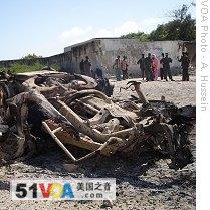Nairobi
24 June 2009
 |
| People, policemen look at the car used for suicide bombing after it struck a military camp for the Somali security forces in the south Mogadishu, 23 May 2009 |
On September 18, 2006, a suicide car bomber rammed his car into a convoy escorting the president of Somalia's transitional federal government at the time, Abdullahi Yusuf, in the central town of Baidoa. The Somali leader was unhurt, but the attack killed his brother and four of his bodyguards.
The attack took place around the time when President Yusuf and his U.N.-backed interim government approved neighboring Ethiopia's plan to amass troops inside Somalia to fight the Islamic Courts Union, a coalition of moderate and hard-line Islamists who had taken over Somalia in June of that year.
The suicide bombing in Baidoa was a turning point for Somalia, whose citizens, up until then, were reluctant to believe that a tactic used by extremists around the world would be imported to be used against Somalis.
Professor Robert Pape at the University of Chicago in the United States has been studying suicide terrorism cases since 1980. He says by inviting Ethiopian troops to invade Somalia, he believes the Somali government created an ideal trigger for the country's first suicide attack.
"From 1980 until the end of 2008, there were nearly 1,800 suicide terrorist attacks around the world," Pape said. "Ninety-five percent of those attacks have occurred in a specific context -- that is in the context of a foreign military occupation of a country. For instance, before the U.S. invasion in March, 2003, Iraq never experienced a suicide attack in its history. Since our invasion, this has become the largest suicide terrorist campaign that we have witnessed."
In late December, 2006, Ethiopia defeated the Islamic Courts Union and installed the government of Abdullahi Yusuf in its place. A violent Islamist-led insurgency ensued and Ethiopia kept thousands of troops in Somalia to prop up the weak government.
Pape says in Somalia, the occupation of troops loyal to a Christian-dominated government in Addis Ababa, backed by the United States, was viewed by most ordinary Somalis as a threat to the country's sovereignty. And it gave al-Shabab, the al-Qaida-linked militant wing of the Islamic Courts Union, the popular support it needed to recruit, re-group, and to carry out increasingly deadlier suicide attacks.
"When you have foreign occupiers viewed as having a different religion, that allows terrorists to paint those occupiers as having a religious agenda to take control of the government and transform the political and social institutions against the wishes of the local population," Pape said.
On October 29th, 2008, five, near-simultaneous suicide bombings shook northern Somalia - three in the breakaway republic of Somaliland and two in the semi-autonomous region of Puntland. In the Somaliland capital of Hargeisa, the presidential palace, the Ethiopian consulate, and the United Nations Development Program offices were hit. In Bosasso in Puntland, the targets were the offices of the Puntland Intelligence Service
Al-Shabab has long accused Somaliland and Puntland of cooperating with Ethiopia and the United States in efforts to identify militant Islamist cells and their leaders in the Horn of Africa. Pape says the militants probably chose suicide bombings because they were the most financially feasible, simple, and intimidating tactic they could use to pressure governments in Somalia to sever relations with Ethiopia and the West.
In January, Ethiopia pulled its troops out of Somalia under a U.N.-sponsored peace deal with a moderate Islamist opposition faction. The transitional federal government merged with the group to form a new government led by former Islamist insurgent leader, President Sharif Sheik Ahmed.
The changes forced al-Shabab and other militants to shift targets. They are now portraying AMISOM, the African Union peacekeeping force in Mogadishu, as foreign occupiers and the unity government as a western puppet. AMISOM troops, Somali troops, and government officials have all been targeted in suicide attacks in recent months.
A Somali civil society leader, who declined to be identified for security reasons, says what concerns him is that he believes al-Shabab leaders are religious zealots, who are continuing to use nationalism as an excuse to seek new religious recruits and expand the war.
He notes that nearly two decades of conflict in Somalia have deeply traumatized the country, especially its young people. And many remain vulnerable to al-Shabab's Salafist/Wahhabist teachings, which extol the virtues of martyrdom in the name of Islam.
"Even if AMISOM is out of the country and the country is for the Somalis alone, I do not think al-Shabab will stop these suicide bombings unless they get what they want," he said. "And what they want is very clear. It is to rule the country and apply their version of Islamic interpretation."
The civil society leader says hundreds, perhaps thousands, of foreign fighters are now believed to be in Somalia to help al-Shabab overthrow the government.
He says al-Shabab has never explained to the Somali people why AMISOM troops are considered foreign occupiers but thousands of foreigners fighting in Somalia are not.